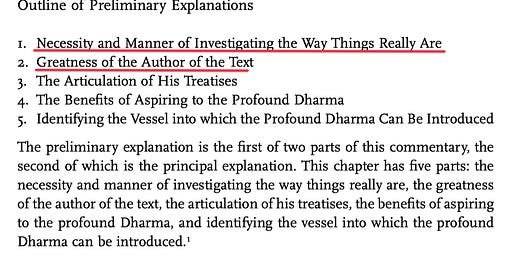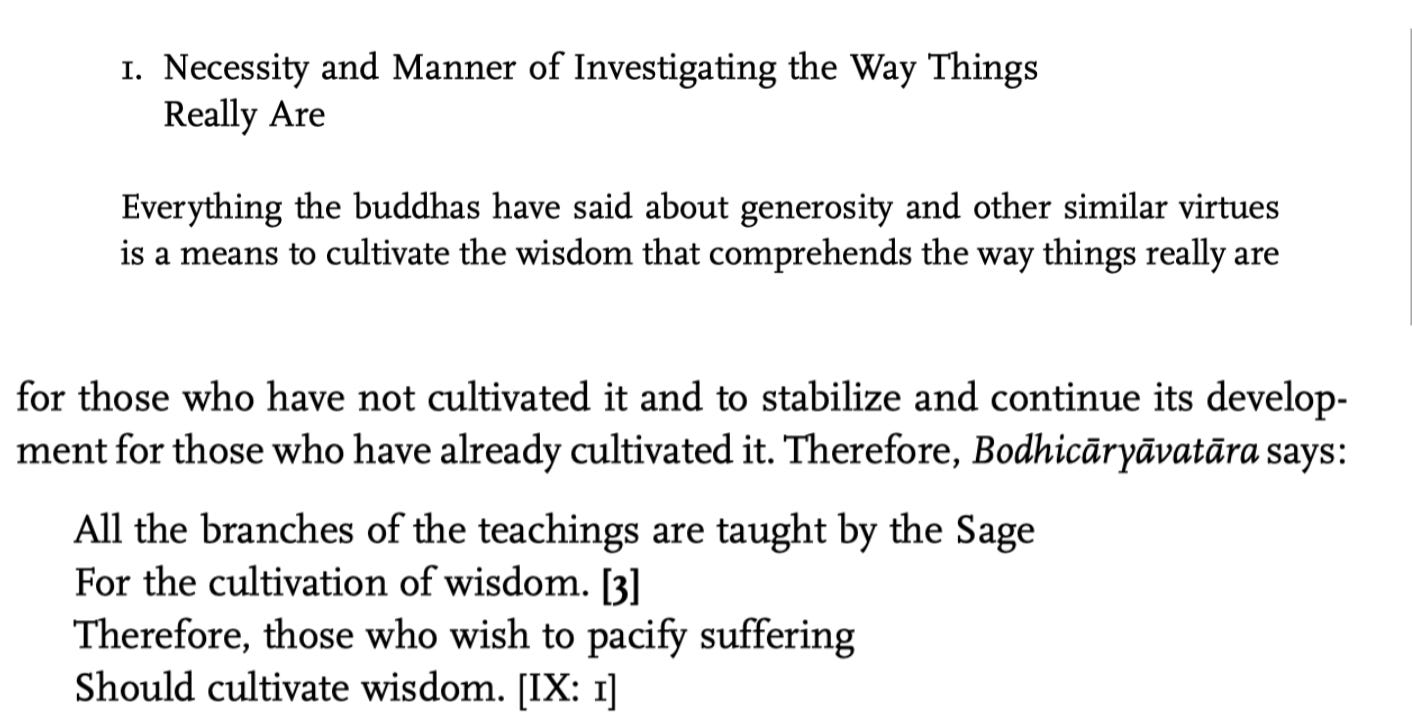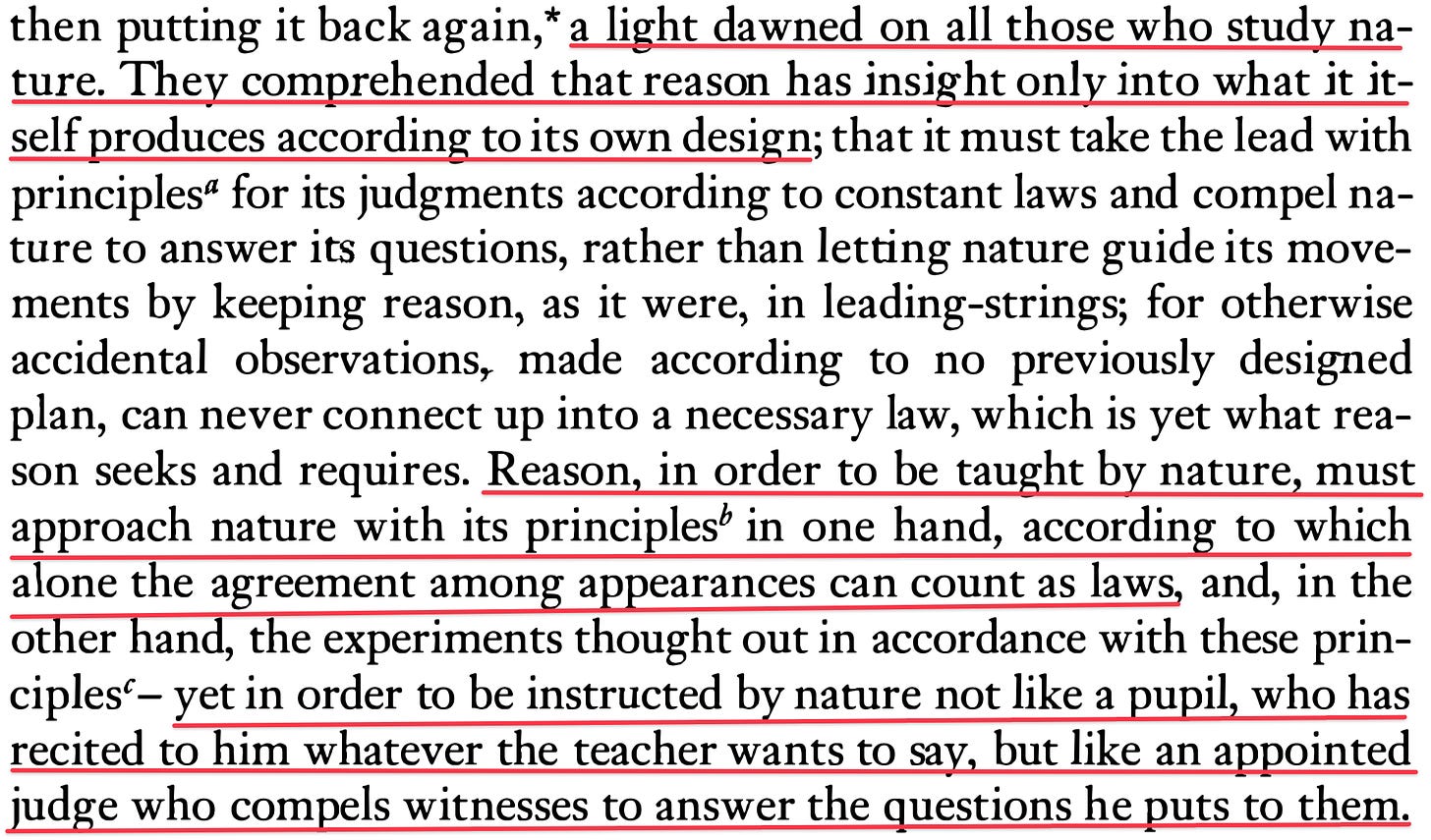Preamble: Preparing the Truth
We want our inquiry to yield reliable and robust truths, especially in the case of abstract disciplines such as Metaphysics. While we might think that truth seeking is a matter of gathering the facts, serious inquiry almost always requires careful preparation, where I am using the term 'preparation' in a technical sense. To learn the truths about motion, we don't study leaves blowing in the wind; instead, we prepare an experiment in which balls fall in a vacuum. How might one prepare conditions in which metaphysical truths are revealed? Tsong-khapa as well as Kant have some thoughts on this matter.
Tsong-khapa
Tsong-khapa starts his text with the claim that it's important to know reality as it actually is; yet another articulation of the metaphysical impulse. Or as Aristotle said at the very beginning of his metaphysics: "All human beings by nature stretch themselves out toward knowing."
And yet, there are crucial differences in the way Kant represents the task of metaphysics and how Tsong-khapa frames his project. Kantian metaphysics is object directed, i.e., uncovering the a priori principles that reason brings to any experience; it's the metaphysics of a subject standing against the world. In contrast, Tsong-khapa's metaphysics is embedded within a lineage that includes gurus who are the embodiments of wisdom. Therefore, his inquiry has to include both the abstract principles that reveal 'the way things really are' and the practices that ripen that understanding in us as living practitioners of wisdom.
Kant
The Critique of Pure Reason was first published in 1781 and a second edition was prepared in 1787. He wrote a preface for both editions. We finished the original preface yesterday and are now ready to cover the preface to the second edition.
Both prefaces set out the nature and scope of Kant's project, which is to (re)establish Metaphysics as a science with secure foundations of the kind that had been established for logic and mathematics in antiquity and had been established for mechanics in the century before Kant.
For that to happen, Kant argued in his first preface that metaphysics would have to set aside speculations about entities such as the soul and God that have no basis in experience and then inquire into those aspects of reason that aren't derived from experience while being necessary to make sense of experience.
This double move is both subtle and profound: you restrict yourself to potential experiences but you don't let those experiences come to you; instead, you stamp the rules of reason upon the world. Metaphysics is the science of all those stamps, the structure of all a priori reason*.*
Kant starts his second preface (which is three times as long - 18 pages to the 6 in the first )by making the case for the stamp factory in a slightly different way. He says:
i.e, we have to do what it takes to turn a domain of inquiry into a science. That has already been achieved three times, twice by the Greeks and once by his peers. Logic was the first science:
According to Kant, logic has the great advantage that it's a purely formal science with no objects of its own; its rules apply to reasoning about any object whatsoever. We might disagree about this assessment today, saying that there's a minimal ontology of sets and functions that even logic depends on, for how else can we express the propositions of logic. But it's still a formal science. Then came mathematics, which does have genuine objects of inquiry:
Mathematics in his conception became a science only when we learned to replace empirical generalizations with proofs that started from first principles, which is to say when the stamp factory learned to produce mathematical stamps through which we could produce geometrical constructions. Mathematics is the first science which gives us confidence that a science of pure reason (i.e., metaphysics) is possible - it has genuine objects about whom we can acquire certain knowledge through the mechanism of proof.
Here too, inquiry becomes science only when reason is able to stamp its principles upon nature, not accept nature's impressions passively.
Kant is presenting a metascientific method on how to turn a domain of inquiry into science. It's not through the collection of facts, but through the careful preparation of a domain so that we only register those features that help us stamp the principles of reason on that domain.
For logic, that means abstracting out everything except for the formal principles of reasoning. For mathematics that means starting with axioms rather than figures and for mechanics, it means controlling the experimental situation so that you roll balls of a known weight down a frictionless plane rather than observing motion in the wild.
What about philosophy? Shouldn't it be a science? Of course it should, and we should start with its queen, metaphysics. Using the same method of careful preparation as one uses for mechanics and mathematics yields the proper domain of metaphysics: reason untainted by experience. Those are the objects whose principles will constitute metaphysics as a science.
Summary
We have seen how Tsong-khapa and Kant prepare the ground for their inquiry. The Tibetan master prepares the person as well as the domain, while Kant restricts himself to the domain alone. The first seems superior as a method, but it's quite possible that as social complexity increases and our scientific process becomes ever more refined, the preparation of the inquirer and the preparation of the inquiry have to take ever more divergent paths.












